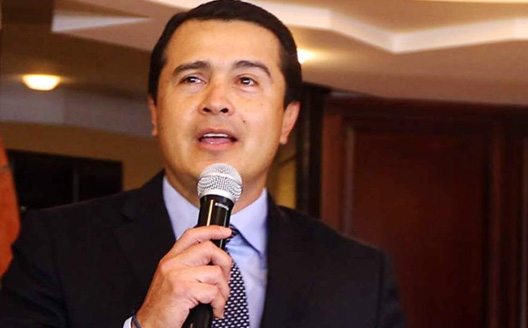Tegucigalpa/Nueva York – El exdiputado hondureño Juan Antonio Hernández fue acusado hoy por la Corte del Distrito Sur de Nueva York por conspirar para importar cocaína a los Estados Unidos, así como delitos relacionados con armas de fuego.
– Tony Hernández también enfrenta cargos por mentir a agentes federales.
Geoffrey S. Berman, el Fiscal de los Estados Unidos para el Distrito Sur de Nueva York, y Raymond Donovan, el Agente Especial a Cargo de la División de Operaciones Especiales de la Administración de Control de Drogas de los Estados Unidos (DEA), anunciaron hoy que el excongresista hondureño fue acusado en el tribunal federal de Manhattan de conspirar para importar cocaína a los Estados Unidos, delitos relacionados con el uso y posesión de ametralladoras y dispositivos destructivos, y hacer declaraciones falsas a agentes federales.
Tony fue arrestado el 23 de noviembre de 2018 en Miami, Florida, y comparecerá esta tarde en el tribunal federal de Miami ante el juez de primera instancia de Estados Unidos, Jonathan Goodman.
El fiscal federal Berman, dijo: “Como se alega, el excongresista hondureño Tony Hernández estuvo involucrado en todas las etapas del tráfico a través de Honduras de cargas de cocaína de varias toneladas que estaban destinadas a los Estados Unidos”.
De acuerdo con la acusación, Hernández supuestamente organizó la seguridad de la cocaína con ametralladoras y embarques, además sobornó a los funcionarios encargados de hacer cumplir la ley para obtener información confidencial para proteger los envíos de drogas y solicitó grandes sobornos a los principales traficantes de drogas.
Gracias al trabajo en curso de la DEA, Hernández está ahora bajo custodia en territorio estadounidense y enfrentando a la justicia en las cortes estadounidenses”.
De su lado, el agente especial a cargo Raymond Donovan dijo: “El tráfico de drogas y la corrupción en todo el mundo amenazan el estado de derecho, alimentan la violencia y la inestabilidad, y dañan a las familias y comunidades inocentes. Hernández y sus asociados criminales supuestamente conspiraron con algunas de las redes criminales transnacionales más mortales y peligrosas del mundo en México y Colombia para inundar las calles de Estados Unidos con drogas mortales. La DEA espera que Hernández se enfrente a la justicia estadounidense y responda por sus presuntos delitos”.
Siembre con base a lo informado por el comunicado oficial de la Corte del Distrito Sur de Nueva York, desde al menos en o alrededor de 2004, hasta e inclusive 2016, varias organizaciones de tráfico de drogas en Honduras y en otros lugares trabajaron juntas, y con el apoyo de ciertos individuos públicos y privados prominentes, incluidos políticos hondureños y funcionarios encargados de hacer cumplir la ley, para recibir cargas de cocaína de varias toneladas enviadas a Honduras desde, entre otros lugares, Colombia a través de rutas aéreas y marítimas, y para transportar las drogas hacia el oeste en Honduras hacia la frontera con Guatemala y eventualmente a los Estados Unidos.
Para protegerse de la interferencia oficial y para facilitar el paso seguro a través de Honduras de cargas de cientos de cientos de kilogramos de cocaína, los narcotraficantes pagaron sobornos a funcionarios públicos, incluidos algunos miembros del Congreso Nacional de Honduras.
A Tony se le señala de estar involucrado en el procesamiento, recepción, transporte y distribución de cargas de cocaína de múltiples toneladas que llegaron a Honduras a través de aviones, buques rápidos y, en al menos en una ocasión a través de un submarino.
{google_docs}http://procesodigital.hn/20181126-TONY-HERNANDEZ-ARREST-PRV3-J-Spanish.pdf|width:520|height:650|link:yes|link_label:Descargar documento{/google_docs}
Hernández tuvo acceso a los laboratorios de cocaína en Honduras y Colombia, en los que parte de la cocaína estaba marcada con el símbolo “TH”, es decir, «Tony Hernández».
Asimismo, la acusación señala que Hernández también coordinó y, en ocasiones, participó en proporcionar seguridad fuertemente armada para los envíos de cocaína transportados dentro de Honduras, incluso por miembros de la Policía Nacional de Honduras y narcotraficantes armados.
Como parte de sus actividades de narcotráfico, Hernández y sus co-conspiradores sobornaron a los funcionarios encargados de hacer cumplir la ley para obtener información sensible para proteger los envíos de drogas y solicitaron grandes sobornos a los principales narcotraficantes de Hernández.
El comunicado oficial puntualiza que en febrero de 2014 en Honduras, Hernández se reunió con Devis Leonel Rivera Maradiaga, exlíder de Los Cachiros, en una reunión organizada por, entre otros, un exmiembro de la Policía Nacional de Honduras.
Durante una parte grabada en video y en audio de esa reunión, Hernández acordó ayudar a Rivera Maradiaga al hacer que las entidades del gobierno hondureño paguen el dinero que se le debe a una o más compañías de lavado de dinero de Los Cachiros a cambio de pagos ilícitos de Rivera Maradiaga. El Cachiro pagó a Hernández aproximadamente 50 mil dólares durante la reunión.
A continuación Proceso Digital reproduce el comunicado oficial Corte del Distrito Sur de Nueva York:
Former Honduran Congressman And Brother Of |








